Tips for making teams work better
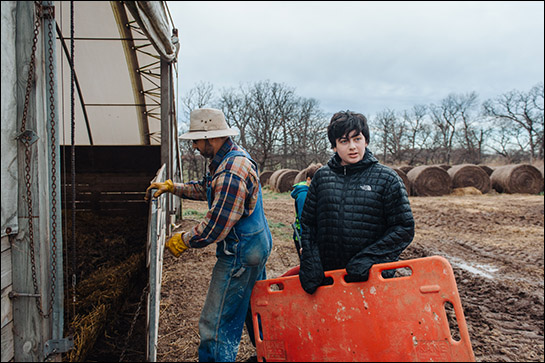
At age ten the Farmer was doing chores before and after school and most of the weekend. This was normal for his family. It’s what his parents did and what their parents did.
I told him my kids were not doing that. Being a full-time farmer means kids don’t have the chance to figure out what they really want.
But now that we live on a farm, I see farming like a language. And the same way it seems sad to me that immigrants don’t teach their kids their native language, it seems sad to me to raise kids on a farm without teaching them how to farm.
So I told the kids they need to start doing more work on the farm.
Make the work matter.
We started with smaller jobs like collecting rotten pears to give to the pigs. It was my idea for something the family could do together.
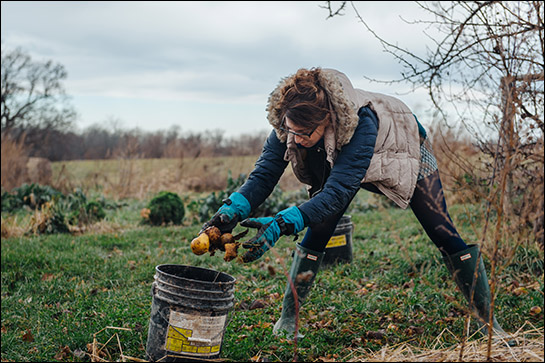
But the kids could tell this was kid work that the parents were doing with the kids. The kids wanted to do adult work.
The final blow for kids collecting the pears was when the kids asked the Farmer if he did this job when he was a boy, and he said no.
I said, “What did you do with the pears on the ground?”
He said, “Nothing.”
Management is about patience.
When the Farmer tells me he is going to ask his dad to help him bed down the pigs, I ask if the kids can help him instead.
The kids meet the Farmer at the end of the barnyard and the Farmer says, “Go back and put on boots. This is a messy job.”
The kids say they don’t want to get their boots dirty.
“What are the boots for if you don’t want them dirty?”
“They’re for clean dirt. Not pig shit.”
“Hey, he can’t say that! Moooommm! He said a swear word!”
The Farmer gets the kids two pair of old boots. I put their names on the boots.
The job is already taking ten times longer that it would have with my father-in-law helping.
I tell the Farmer that I read that people who have gratitude have more patience.
He says, “P, I have plenty of patience.” He only starts a sentence with P when he’s being impatient. The Farmer thinks if he doesn’t say hurry up then he’s being patient.
I am patient with his inability to be patient, so I tell the kids just to do what he says.
An important part of farming is not talking. Farmers don’t talk to each other. They say it’s because animals get more difficult to work with if they hear voices. But really farmers get more difficult to work with if they hear voices. No one chooses farming to socialize.
Get the right people for the job.
The pigs need straw on the floor of their building to prevent it from becoming too wet.
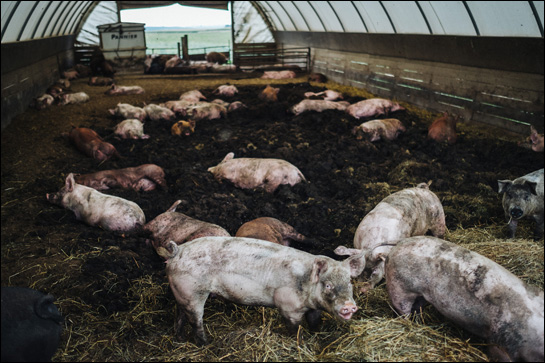
And the pigs like to build little nests with the straw. When they get low on straw it gets mushy muddy on the floor, so we need to bring a huge hay bail to them.
The boys fail the first time.
Imagine two pre-teen boys fighting with each other in foot-deep pig manure, trying to handle 40 300-pound pigs. Do you have that image? Now imagine my older son gets his boot stuck in the manure.
“It was like quicksand!”
That’s how he explains it to me.
“It was like living hell,” is how the Farmer explains it to me.
So the next time I go with the boys to do the job.
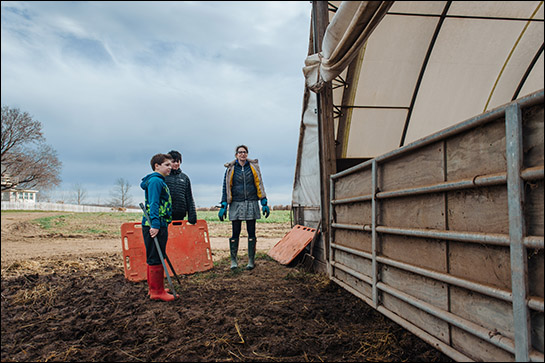
Match each person with the right tools.
The trick is keeping the pigs away from the gate, but they love getting out of their building. For most of the summer the pigs are on pasture, so they know being in the building is a rip off.
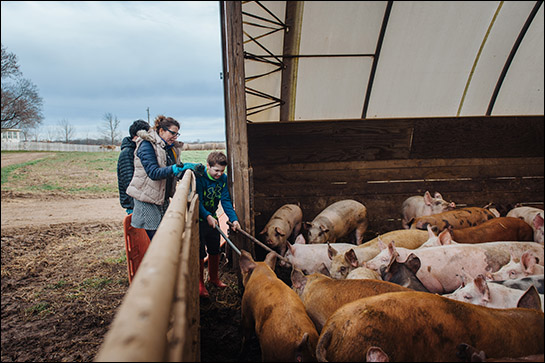
The kids and I clear the gate end of the hoop building. Each boy takes one side. The Farmer gives the kids sticks to defend against the pigs. The younger boy is a natural, wielding the sticks like a Medieval warrior. The older son is horrified at the thought of accidentally poking the pig with a stick, and he screams about how the sticks are immoral. So he gets a panel. The pigs see both types of tools as something to avoid.
“Mom, what are you doing? You need a stick.”
“I’m supervising. Watch your pig.”
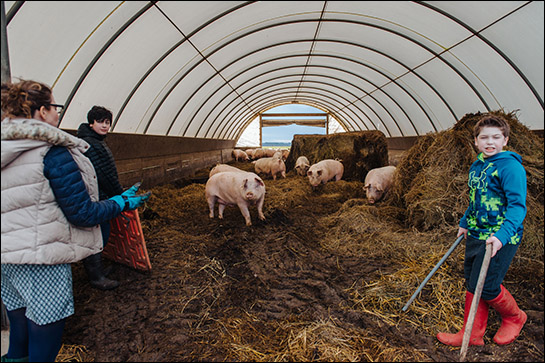
Teach people how to communicate.
Older son: Mom tell him to shut up.
Younger son: I’m doing call outs.
Older son: We don’t need call outs. This is not a video game.
Younger son: I’m just telling you where the dangers are. You were about to let a pig out.
Me: I thought people don’t like call outs.
Younger son: They like call outs. The big kids don’t like me talking during the game because they say I’m a squeaker.
Older son: Yeah well if older kids don’t want to hear you do call outs on your video game, then just assume I don’t want call outs either.
Me: Fine. Great. So we have some ground rules. Don’t talk unless someone is going to get hurt.
We take our positions. The Farmer drives the loader in the building with a hay bale for the pigs.
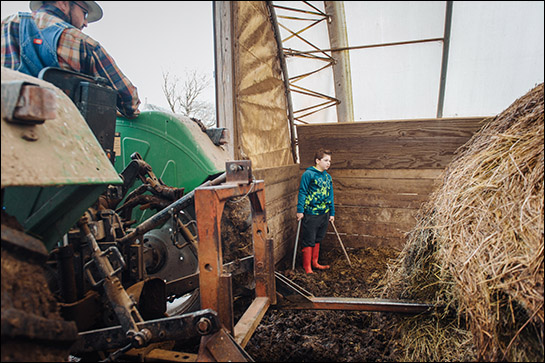
The boys stand quietly, probably thinking of the next thing to fight about. But for a short moment, all you hear is the snorting of pigs waiting for straw and the squish of the loader navigating manure.
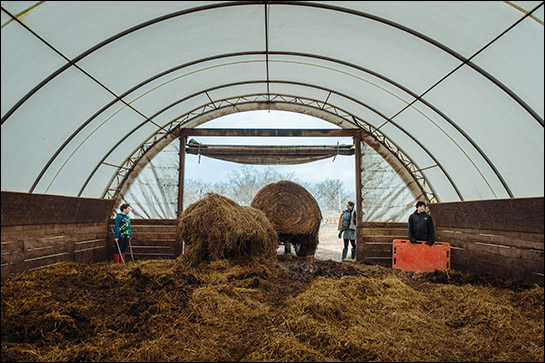
Don’t put a non-manager in management.
We close up the gate. The pigs have hay bales, no pig was hurt, no child got stuck. It was a job well done. But the Farmer doesn’t say that. It doesn’t occur to him to say that.
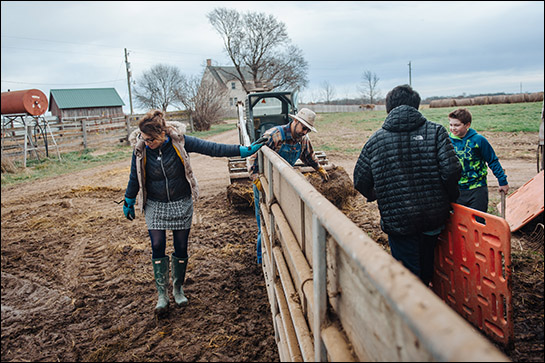
I tell the boys “good job” and then the Farmer remembers he is supposed to be positive, and says, “Yeah. Good job. Thanks, you guys.” He is trying to be a motivational team leader, but he doesn’t see why people need to be motivated by someone else to do a good job.
“Show gratitude,” I tell him.
I know he privately sees a million ways the team could have worked better. We could have moved faster. We could have kept the pigs calmer. We could have stayed further away from the wheels of the loader.
I tell him a team is like a marriage. There is never just one crazy person in a marriage—because it takes a crazy person to pick a crazy person. And there is never a good manager managing a bad team. Because everyone can be a good team member if you give them what they need.
He says, “What does that mean?”
“It means if you want a more competent team, be a more competent leader.”
He is speechless.
The next time the pigs need bedding down, he does the job himself. Two pigs get out, and he has to herd them back into the hoop building, and it takes an extra thirty minutes, but he’d rather do that himself than lead a team.

It does seem a shame to live on a farm and not learn how to farm. But an even more important aspect of the boys learning to farm is working with their father. Boys are generally raised by a woman in their early years and so become very familiar with the world of women. Boys need to be introduced into the world of men when they are pre-teens. They may not like it at first, but it is an essential part of growing up.
Happy to see the pig pics!!! Love this: There is never just one crazy person in a marriage—because it takes a crazy person to pick a crazy person. And there is never a good manager managing a bad team. Because everyone can be a good team member if you give them what they need.
Double whammy.
Why in this world are these sons not out there working with their dad? Why are you in the middle of this? Go pick up the pears and let the sons work and learn from their dad. These boys seem so out of place in their own environment. All very confusing and unproductive it seems. Yep. These sons need to grow up and respect their dad and his field of expertise….
What like Farm Kings?
Grate article, Penelope! The point where you say, “Don’t put a non-manager in management.” I think the corporate world is very primed to think that managers are better or more successful in their careers. How do non-managers combat this? Should they not work in a corporate setting?
That’s a great question. Companies where the output is very important — for example, where their brand is very high quality — usually have good career paths for non-managers. This is because creating a high-quality product requires people who actually DO the work to be great at their jobs. And people who are great at DOING work are not usually good managers. Because it’s two different skill sets.
So, for example, a company like Apple or Facebook has a way for non-managers to continue to learn and grow without going into management. Look for companies like those.
Penelope
In my company there have been people who have been very good at selling. They meet their targets every other month. When supervisor roles were created (the company was growing and more sales people were employed), I applied yet I was doing so poorly. In the interview the simple question I was asked is..How are you going to lead when you cannot even meet your targets. I told the panel that I considered that a leadership role, which I am best fit. Any way I never got the job and top five in sales were promoted. I never felt bad because that was the criteria. What is going to happen after this?
Here is how an INTJ wants to bake cookies: Point him in the direction of the kitchen and then leave him alone to bake cookies.
Here is the corporate way of baking cookies: The kitchen is crammed full of twelve people. It’s one person’s job to go into the kitchen and turn on the light. It’s another person’s job to preheat the oven. It’s another person’s job to melt the butter. It’s another person’s job to measure out the flour. The team has an initiative manager and a project manager, neither of whom perform any of the necessary steps, but they get paid the most. The twelve people trip over each other’s feet and spend a lot of their time waiting on each other, so they are bored. Yet oddly, they make twice as much money as people working in small kitchens. Therein lies the tradeoff.
The unfortunate thing is, almost no one in the corporate world wants to become a manger because they want to bring out the best in the people who report to them. They want to become managers because it gets them out of the grunt work and pays better.
If you can find non-corporate work that pays enough for you to live on, I think that is a great idea.
Loved this post for so many reasons. And your pig-herding outfit? Cute! My oldest child is 21, youngest 17, and I wish I’d learned the “encouragement = motivating” rule many years ago. Hopefully the Farmer will come around after his escaped pigs scenario and have your boys help again.
Hey, I know what would be fun next time you write a similar post — video excerpt!
Given the personalities, and the circumstances, I can fully understand why the Farmer did the last bedding job by himself. It gave him a break from doing things a new way. Made his heart stop racing when the process wasn’t what he was used to. Maybe it even gave your boys the same kind of break.
I think what’s more important is that the NEXT time the pigs have to be bedded, the boys should be involved again. They will be more familiar with the routine, do a better job, and your role can be less conspicuous.
There may be several iterations of solo work and work with the boys. There may be occasions where the isn’t enough time to manage novices and get the job done in time. Still, the Farmer needs to think about his role as a Working Dad, and the boys need to learn why Dad’s work is productive and important and worth learning. The boys can’t learn from their dad until he’s willing to share his knowledge with them. One of these days, depending on the boys’ skills and how well the Farmer can help those skills develop, tasks may move out of the pig barn. A lot depends on the Farmer.
And Rome wasn’t built in a day.
So valuable on so many levels!
You are truly a visionary across boundaries!
Thank you for this post and the pig pictures.
I have always considered pigs to be messy and dirty. This makes me see pigs differently. I don’t remember seeing someone with pigs on their farm here in Kenya.
It seems like the Farmer is getting a taste of his own medicine. In your blogs about Domestic Abuse, you took responsibility. Now, when your boys are misbehaving, you ask him to take responsibility for them.
On the other hand, if a relationship is like gears, changing one gear does not automatically change the other; rather, the act of changing in an abusive relationship becomes more difficult because the one that doesn’t change keeps pulling the other one back. If your boys are behaving in a certain way, they might be anchoring the Farmer to his current style – just as it is with you and him in your relationship.
This applies to corporate management. Bosses have to decide if problems on their team require a change in the makeup of the team, or a change in the makeup of the manager, or both. Sometimes firing an employee just creates a situation where there is a problem with another employee, and sometimes firing that employee means everyone signs a breath of relief.
The farmer reminds me of my father. I always assumed he would never have anything to do with management because of all the years he spent working at the post office. The union was too strong to let lack of competence be used as a reason for termination. So, as he told it, SOP was to get incompetent people out of the way by promoting them to management.
I really never considered that it was just his personality. This would also explain my memories of getting yelled at for not knowing things that he would never have bothered to explain.
Penelope, I was a participant in an online seminar with you and Maria Killam, way over a year ago (I can’t remember really when it was) and I have been following your blog ever since. I LOVE YOU. I started with a new company in January of this year and I have been labelled the General Manager though the pay does not reflect it (I need to keep reading your blog). This one touched me, more than the others have even though they also get me, and I will be using it as a jump off point when I finally have the courage to call a company meeting. Our “leader” is not a leader at all, though our “work family”, as crazy as it is, works. I needed this blog today, to keep going, and I wanted to thank you.
Question – is this the more humane method of raising pigs that you mentioned some time ago? Was wondering how that was going.
It’s a start. The Farmer would want to have the pigs on pasture all the time. But the pigs are really hard on the land. So you need TONS of land to give to pigs — way more than he could do. So the Farmer is experimenting with rotating on and off pasture. Winter and summer. Farrowing and not farrowing. Things like that. It’s a lot of experimenting to see what pigs do to the land and what the land can handle.
Penelope
Love the pigs!
OK I recognize myself in this, nagging my husband to do things with the kids and be patient. It’s easy to tell someone else what to do, much harder to model it. Penelope, I think you are missing some nice words for your husband too, recognizing he is trying hard and well out of his comfort zone. So try not to end by telling him he is incompetent but show your gratitude that he stuck with it and it went well all things considered. I’m working on this one myself…
USA was created by agrarians, farmers fighting the educated English who had centuries more experience. More, Washington-Adams-Jefferson-Madison were ornamental gardeners too. Who knew, Madison is the ‘forgotten father of environmentalism’, among many other topics.
Founding Gardeners, by Andrea Wulf knocks it out of the ballpark. http://www.amazon.com/dp/0307390683/?tag=ptrunk-20
Unable to have children, but I know my mom! “Get the pears in today.”, she wasn’t about to get a single pear. Pigs need hay? Dad would have us in there, plenty of language to match the pig shit, helping. Mom nowhere in site.
You remind me of a line from, Empire of the Sun, ” Try not to THINK so much! ” Have to remind myself of that at times too.
Garden & Be Well, XO T
“There is never just one crazy person in a marriage—because it takes a crazy person to pick a crazy person.” Truer words were never spoken. This post is great on so many levels but that was my favorite part of it.
Your parallels between marriage and teambuilding are spot on. It’s why my marriage eventually didn’t work: we were rarely able to work as a team.
Great read. I like how you sum up the point in the end. Too bad the farmer was to stubborn to listen (and learn something).
I think we need to give the farmer a bit of a break, just as he needed to give one to the boys. He’s not used to working with them. Give him time and he’ll get better. And really, yes, if you live on a farm, you should be out there working. You can’t reap the benefits without contributing. I’m betting if they help for a while everyday (and Penelope, you keep out of it:-), they’ll all grow together in their work and management.
“There is never just one crazy person in a marriage—because it takes a crazy person to pick a crazy person.” So NOT true as anyone who has been married to an abusive, controlling Cluster B personality-disordered person can tell you. These people pick on the vulnerable to be sure but we weren’t “crazy” before becoming involved and ultimately, severely affected, by these sick and abusive people. The rest of the article was fantastic by the way.
Having grown up on a dairy farm your Farmer is quite typical of many farmers. It is not an easy job; lots of economic and physical risk, danger from unpredictable animals, weather, machinery, markets, government agricultural schemes & competition from outside markets. A very lonely career. You have to like being alone — i.e. without humans around to do this career. Not much opportunity nor incentive to develop ‘people skills’ Trying to work safely, & make enough money to live while constantly facing higher costs of materials, supplies, feed, transportation, etc. While the unit cost of the product (in this case its pork) drops. It’s either go big or go home. Or create a unique product — i.e. organic, free-range, etc. for a niche buyer group such as at the Farmer’s Market. Or go independent and do your own marketing. I think farming is the ultimate in entrepreneurialism.
This is the first time I came across your blog and this is very interesting and unique. I enjoyed it and amazed with your writing style. It’s true that working as a team brings better results and too without making much efforts.
Effective communication skills are must to make a great team, as people feel free to express their thoughts, opinions, and potential solutions to problems. People feel as if they are heard out and listened to by team members who are attempting to understand.